Private Sector Pavilion at International Solar Festival presented by TERI and Becquerel Institute
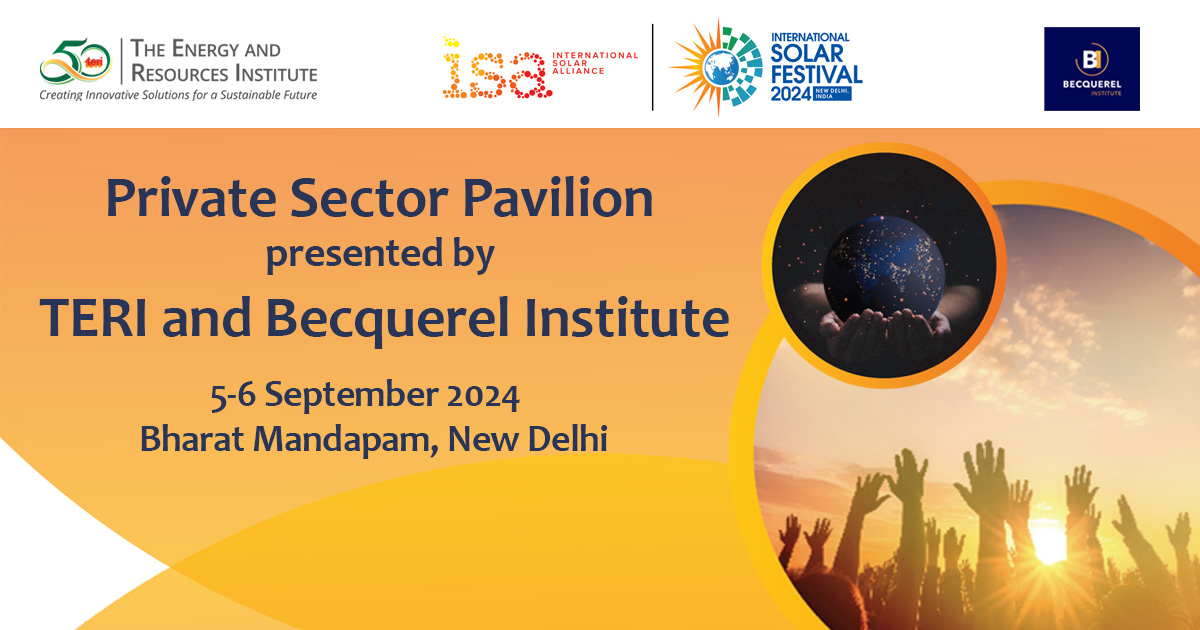
TERI, in partnership with the Becquerel Institute, successfully hosted the Private Sector Pavilion at the first International Solar Festival organized by the International Solar Alliance (ISA) from September 05 – 06 in New Delhi.
The Private Sector Pavilion was inaugurated by Shri Pralhad Joshi, Hon’ble Minister of New and Renewable Energy, Government of India, and the ISA Ministerial Delegation.
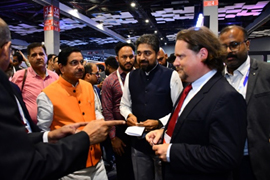
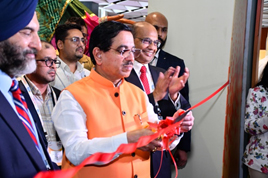
Sessions organized at the Private Sector Pavilion delved on:
Discussions at these sessions echoed the address of Hon’ble Prime Minister of India Mr Narendra Modi at the Solar Festival, stating that the “mantra to increase solar adoption is awareness, availability, and affordability”.
At the leadership panel, ‘India’s enhanced role in North-South partnership on faster solar energy transition’, Mr VK Dewangan, Managing Director and Chairman, REC Limited, highlighted the barriers overcome by the agency to promote installation of rooftop solar panels including conducting massive awareness campaigns among consumers to make solar the preferred source of energy. REC Limited has also embarked on a large-scale training exercise to equip workers with the requisite skills necessary to ensure installation of solar panels.
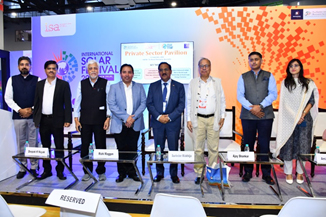
Making the solar ecosystem resilient depends on various factors. One of the measures recommended by panelists was the need to strengthen India’s transmission infrastructure. Given that the turnaround time for the completion of solar projects is approximately 2 years, a similar speed has to be accorded to improve transmission lines, and the distribution system. Read the press coverage of the session here: Krishak Jagat, Solar Quarter,Battery Business and EQ International. The LinkedIN post on the session could be accessed here.
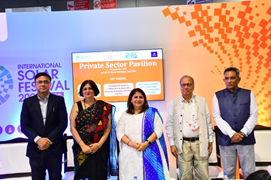
The extreme concentration of the solar PV supply chain presents multiple risks, geopolitical and economic. The development of local solar PV manufacturing across the globe would bring advantages to the entire sector, from end customers to project developers as well as public authorities.. At the trialogue session, ‘Making solar the energy source of choice – Building resilient supply chains for clean energy transitions in the Global South’, Dr Vibha Dhawan, Director General, TERI, highlighted the competitive advantage India holds in harnessing solar energy given that the country experiences higher number of sunshine, and illumination days.
Dr Paravastu Rambabu, Chief Sustainability Officer, Greenko Group, shared that expansion of India’s renewable energy capacity will not translate to 24x7 electricity supply, and storage will be critical in making the intermittent solar energy available round-the-clock.
Given that India has a national grid system, storage solutions sought by India, will vary from the storage solutions sought by other countries and geographies. Further, panelists discussed the need for India to allow different solar technologies to develop, and eventually be made available, on a level playing field. Ms Sunita Sule, Head of Office – Corporate Government Relations, BASF, stressed that businesses across the world are looking towards Asia, and especially, India, as the next growth markets. Given how businesses are looking at decarbonization measures in the wake of climate change, making the solar sector resilient becomes crucial. Solutions, such as sodium sulphur batteries, present one such alternative solution to lithium-ion batteries whose raw materials are in short supply and remain susceptible to price fluctuations. Similarly, the production of molten salts by the chemicals industry represents an opportunity to develop the market of concentrated solar thermal plants. Read the press coverage of the session here: Solar Quarter, Krishak Jagat. The LinkedIN post on the session could be accessed here.
At the fireside chat, ‘Getting Just Energy Transitions at centrestage with enhanced Private Sector Investments – Models for Multistakeholder Collaboration’, Mr Rishiraj Choudhury from Gruhas, elaborated on key solutions being actively considered by the investor community as part of energy transition. Battery energy storage systems (BESS), electric vehicles and its supporting infrastructure, green hydrogen, and CCUS were the key technologies that the investor community, especially venture capitalists was looking at.
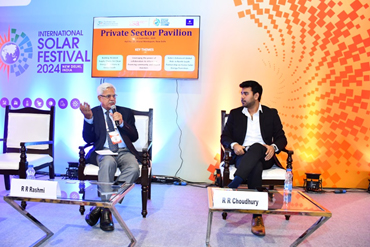
Mr RR Rashmi, Distinguished Fellow, TERI, shared that as per several modelling studies, India’s emissions will peak around 2045. Meeting the long-term net zero goal of 2070 would require focusing on decarbonizing the hard-to-abate sectors, and focus on demand-side management. Suggestions were made to set clear mandates on offtake of green hydrogen by the end-use industries. Export of green hydrogen was another option that the government could explore as India looks to expand its green energy technologies. Expansion and uptake of solar energy is dependent on enhancing financing for projects, and leveraging carbon markets presents one way of channelizing climate finance to the global South. Under the UNFCCC mechanism of carbon markets enshrined in articles 6.2 and 6.4 of the Paris Agreement, 14 technologies, some relating to solar energy such as solar cook stoves, and solar pumps, have been made available for carbon credits.
Panelists also delved into discussions on the role that India could play in helping transfer its knowledge of low cost solar transition to developing geographies of Africa, and Pacific Islands. Creation of an institution such as the International Solar Alliance represents one such platform through which India could share its leadership experience on transitioning to solar energy, and aptly serve towards bridging gaps between the Global North and Global South.
The Private Sector Pavilion also hosted two technology showcase sessions. Presentations of the sessions can be accessed from below:
Decarbonizing India’s electricity sector towards achieving Net Zero – Insights from national and sub-national studies
Mr A K Saxena, Senior Director, TERI
Use case for storage solutions
Mr Vaibhav Dalvi, South Asia – Energy Storage, BASF New Business
Integrating solar in agriculture - achievements and impacts (beyond GHG reduction)
Mr Surinder Makhija, Senior VP and Strategic Advisor, Jain Irrigation Systems Ltd.
Key global trends on Optimizing Solar EPC Supply Chain
Mr Gaëtan Masson, CEO, Becquerel Institute
Key global trends on solar and storage solutions
Mr Gaëtan Masson, CEO, Becquerel Institute
Solutions to advance the clean energy solutions in the Global South and small islands countries
Mr Karthik Govindarajan, Vice President & Head – International Business, Ecozen Solutions Ltd
Read the article by Becquerel Institute on co-hosting the Private Sector Pavilion with TERI, here.
Scan the QR Codes below to access knowledge resources by TERI and Becquerel Institute:
 TERI
TERI Becquerel Institute
Becquerel Institute